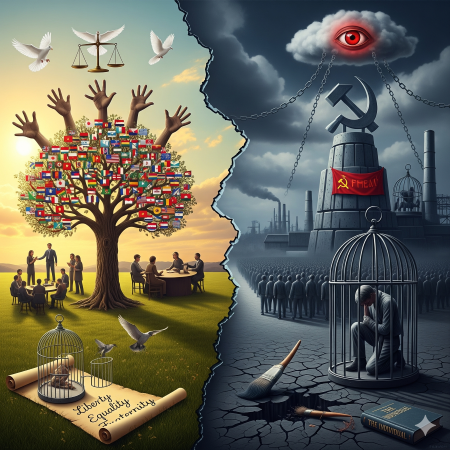When has democracy been manipulated to justify war, colonization, or oppression?

While democracy is founded on principles of equality and liberty, its ideals have at times been manipulated by governments and dominant groups to justify actions that are undemocratic in practice.
This often occurs when leaders frame military or social actions as a way to "liberate" or "civilize" others, even if the true intent is to gain power, resources, or control.
Justifying War
Democratic governments have used the pretext of spreading democratic values or "freeing" a population to gain legitimacy for military interventions.
-
The Iraq War (2003): The U.S. and its allies presented the invasion of Iraq as a mission to remove a tyrannical dictator, Saddam Hussein, and establish a democracy. The claim was that this was necessary to protect the Iraqi people and to prevent Hussein from using weapons of mass destruction. However, no WMDs were ever found, and the war was widely criticized for being based on false pretenses, leading to a prolonged conflict and instability.
-
The Vietnam War: The United States justified its involvement in the Vietnam War as a defense of a democratic South Vietnam against the communist North. This intervention was part of the broader Cold War strategy of containing communism, but it was framed domestically as a noble effort to protect a nation's right to self-determination. The conflict was highly divisive and ultimately failed to establish a lasting democracy.
Justifying Colonization
Colonial powers, including those with democratic systems, have often used the rhetoric of "civilizing" missions or preparing colonies for self-rule to justify their imperial expansion.
-
Manifest Destiny (U.S.): The concept of Manifest Destiny in 19th-century America was used to justify the aggressive westward expansion of the United States. It promoted the belief that Americans were divinely ordained to spread their democracy and civilization across the continent, displacing Indigenous peoples and annexing their lands in the process.
-
The "White Man's Burden" (Europe): In the late 19th and early 20th centuries, European democracies like Great Britain and France used the idea of the "White Man's Burden" to justify their colonial empires. This ideology framed colonization as a moral duty to civilize, Christianize, and modernize the peoples of Africa and Asia, even as these colonies were brutally exploited for their resources and labor.
Justifying Oppression
Within democratic societies, the mechanisms of democracy itself—such as voting and lawmaking—have been used to formally institutionalize the oppression of minority groups.
-
Jim Crow Laws (U.S.): For nearly a century, from the late 1800s to the mid-1960s, a system of state and local laws known as Jim Crow legally enforced racial segregation and disenfranchisement in the Southern United States. These laws were passed through the democratic legislative process and upheld by the judiciary, effectively denying African Americans the right to vote, own property, and participate fully in society.
-
Apartheid in South Africa: The system of Apartheid was a form of institutionalized racial segregation and discrimination enforced by the white-minority government in South Africa from 1948 to 1994. Although South Africa had a parliamentary democracy, the system was designed to benefit the white minority and systematically disenfranchise and oppress the non-white majority. Laws were passed through the democratic process that controlled where people could live, work, and vote based on their race.
- Questions and Answers
- Opinion
- Motivational and Inspiring Story
- Technology
- Live and Let live
- Focus
- Geopolitics
- Military-Arms/Equipment
- Sicherheit
- Economy
- Beasts of Nations
- Machine Tools-The “Mother Industry”
- Art
- Causes
- Crafts
- Dance
- Drinks
- Film/Movie
- Fitness
- Food
- Spiele
- Gardening
- Health
- Startseite
- Literature
- Music
- Networking
- Andere
- Party
- Religion
- Shopping
- Sports
- Theater
- Health and Wellness
- News
- Culture

